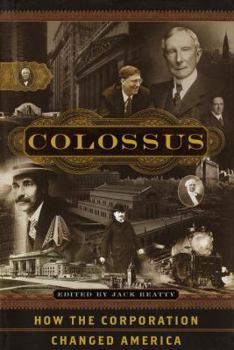Colossus: How the Corporation Changed America
Select Format
Select Condition 
Book Overview
Big business has been the lever of big change over time in American life, change in economy, society, politics, and the envelope of existence--in work, mores, language, consciousness, and the pace and... This description may be from another edition of this product.
Format:Hardcover
Language:English
ISBN:0767903528
ISBN13:9780767903523
Release Date:April 2001
Publisher:Broadway Books
Length:506 Pages
Weight:2.00 lbs.
Dimensions:1.6" x 6.6" x 9.5"
Customer Reviews
5 ratings
Vivid Look at the Rise and Impact of Corporations
Published by Thriftbooks.com User , 19 years ago
The aptly named Colossus is an eclectic anthology portraying the rise of the corporation from the 1600s to the present. Editor Jack Beatty's own essays and writers ranging from Charles Dickens to Paul Johnson to James Hedges vividly demonstrate the corporation's impact. This collection of biographies, literature, historical documents, newspaper articles and so on are in roughly chronological order, with each prefaced by an incisive explanation by Beatty. Beatty's through dissection begins with the Virginia Company of London (1606) - the first corporation. He skillfully takes us to the 1700s as corporations begin to replace partnerships. Betty's coverage of the years 1820 to 1860 - when corporations begin to flourish - is extremely informative, yet lacks the energy exhibited by the rest of the book. By the late 1800s through the early 1900s, corporations begin to grow enormously in size and power. Betty chronicles this period with great verve through his richly detailed selections. Beatty resurrects the Great Depression quite effectively via John Steinbeck's The Grapes of Wrath, while his excerpt from Joseph Heller's Something Happened succinctly illustrates the paranoia of office politics during the era after World War II. Another superb choice is Peter Drucker's short essay showcasing the hostile takeovers that were so prominent in the 1980s. Also, Susan Faludi's Pulitzer-prize winning expose of the 1986 leveraged buyout of Safeway Stores is a beautifully written piece of reportage about the aftermath. Corporations have committed their share of sins and embodied their portion of moral relativism. Social responsibility is a pervasive theme in this book, beginning with Beatty's preface, which reminds us that intervention must come from stockholders, as well as the public at large. He writes, "The corporation is no longer pitched against society; the corporation is society." Bohdan Kot
Macro Perspective...Micro Analysis
Published by Thriftbooks.com User , 22 years ago
How to describe this book? It has immense scope ("how the corporation changed America" during the past 350 years) but, under Beatty's brilliant supervision, the narrative somehow retains a sense of intimacy as he and others focus on defining moments, pivotal developments, heroes and villains, great business successes as well as failures, shifting roles played by the federal government, westward expansion, two world wars, natural disasters, and the emergence of high technology This is indeed an epic narrative worthy of Tolstoy with a diversity of "characters" worthy of Dickens. Beatty skillfully blends all manner of different sources with a series of his own commentaries. Great stuff.
Insightful!
Published by Thriftbooks.com User , 22 years ago
Jack Beatty combines his own analyses with writers' essays, articles and other materials to chronicle the American corporation from its inception in the 1600s through the present. His overall conclusion seems to be that corporations are a source of more evil than good, but don't let this bias throw you - this collection of sometimes brilliant writings is captivating reading. We from getAbstract highly recommend this book to all students of business history, especially those whose views of the corporate colossus tend toward the darker side.
Big Military-Industrial-Congressional Complex v. The People
Published by Thriftbooks.com User , 23 years ago
Jack Beatty assembles a chorus of voices, in Colossus, singing the effects of the corporation upon America. These voices cohere in contrapuntal fashion, in such a way to leave one wondering for some time as to the bent of the author toward the corporation.From Vanderbilt to Gates, he describes the "financial fathers" and the edifices which they have created. We are given the stories of their evils and virtues, much rehearsed in other works by various authors. What Beatty achieves, however, through using a chorus of voices is a perspicacious view, all congealing to a fine conclusion, which so often falls hollow in historical works.Beatty succeeds in making concerns about the future of the corporation very relevant by demonstrating a trajectory of the corporation through history. First, corporations are a set up for public works...then for profit with the public good in view. The public good recedes further and further from the purpose of the corporation.All the while the government sector does a dance of power with the corporation. While the corporation spirals to ever greater spheres of influence, Government takes on more and more protective roles. Sometimes the corporation is out of control, other's government is implementing a disciplinary measure. The now popular whipping boy of the media, Big Government, has nothing on the evils of corporate power.What could be more relevant to a time when we have seen the concentration of power into the board rooms of few corporations? When we have seen the installation of a corporate lackey into one of the highest positions of power in the world? A very important read for any person concerned with the role of the corporation.
Essays, poems, editorials and company histories
Published by Thriftbooks.com User , 23 years ago
These writings consider the impact on American history and events of the rise of big business, using essays, poems, editorials and company histories to reveal that it's the corporation which has ultimately served as the agent of social change in this country. An intriguing collection of writings provides a different kind of economic and social history: one based on business events.






